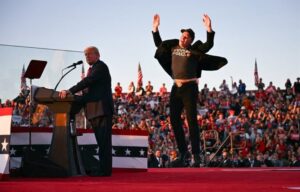
Billionaire entrepreneur Elon Musk experienced a significant boost in his fortune just hours after Donald Trump’s victory in the 2024 U.S. presidential election.
Musk, who has been a vocal supporter of Trump, saw his wealth surge by approximately $13 billion as Tesla’s stock soared following the election outcome.
Early on Wednesday, markets reacted strongly to Trump’s win, with investors expecting favorable conditions for Musk’s electric vehicle company.
Tesla shares (TSLA) jumped by 13% at the market’s open, according to a CNN report. This rapid stock surge added substantial value to Musk’s holdings, which include 411 million shares in Tesla.
Musk’s backing of Trump has been evident throughout the campaign. He contributed nearly $119 million to a political action committee (PAC) supporting Trump, as shown in Federal Election Commission filings.
Additionally, Musk has appeared at Trump’s campaign rallies and hosted a widely viewed interview with Trump on X, the social media platform he owns, solidifying his position as a prominent supporter in the business community.
“He’s bet big here. He dove into the deep end of the pool on this election,” said Daniel Ives, a tech analyst at Wedbush Securities, commenting on Musk’s outspoken support for Trump.
While much of Musk’s net worth was tied to Tesla and other ventures that have benefited from government support, including SpaceX, analysts suggest that even if Trump’s presidency leads to a reduction in federal backing for electric vehicles (EVs), Tesla may continue to thrive.
Though Trump previously criticised electric vehicles, stating they were too expensive, had limited range, and could harm jobs in the auto industry, some experts believed that a rollback of government incentives could favour Tesla, which became a dominant player in the EV market.
Musk appeared unfazed by those potential challenges, taking to his platform X to celebrate Trump’s victory. “The people of America gave @realDonaldTrump a crystal clear mandate for change tonight,” Musk tweeted late Tuesday.
Trump’s campaign rhetoric also included a pledge to end what he called “Biden’s EV mandate,” though no specific mandate existed.
Under President Biden, there were significant federal support for the electric vehicle industry, including billions in loans to automakers for building EV factories and battery plants, as well as a $7,500 tax credit for EV buyers.
How Trump’s administration might alter this support remained unclear, but analysts predicted that Musk’s wealth and Tesla’s market position were unlikely to be significantly affected in the near term






